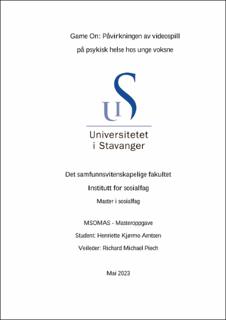| dc.contributor.advisor | Piech, Richard Michael | |
| dc.contributor.author | Arntsen, Henriette Kjørmo | |
| dc.date.accessioned | 2023-07-14T15:51:36Z | |
| dc.date.available | 2023-07-14T15:51:36Z | |
| dc.date.issued | 2023 | |
| dc.identifier | no.uis:inspera:150066902:96045013 | |
| dc.identifier.uri | https://hdl.handle.net/11250/3078937 | |
| dc.description.abstract | Bakgrunn: Å undersøke hvordan videospill påvirker psykisk helse hos unge voksne,
ettersom det er et område som ikke er tilstrekkelig undersøkt tidligere. Studien tar
utgangspunkt i at videospill er en populær og økende form for underholdning blant
unge voksne og ønsker å bidra med økt forståelse for hvordan dette påvirker psykisk
helse.
Hensikt: Å undersøke sammenhengen mellom videospill og psykisk helse blant unge
voksne, med fokus på deres oppfatninger og potensielle faktorer som spiller en rolle.
Metode: Det er brukt mixed-method med en pragmatisk tilnærming. Både det
kvantitative og kvalitative aspektet av studien består av en anonym undersøkelse, med
åpne og lukkede svar, som ble gjennomført på nettet. Utvalget ble rekruttert ved hjelp
av felles bekjente og sosiale medier. Dataene fra spørreundersøkelsen ble analysert
gjennom deskriptiv statistikk og tematisk analyse.
Resultater: Videospill kan ha både positive og negative effekter på deltakernes
psykiske helse, avhengig av sjanger, tekniske og sosiale faktorer. Tidligere erfaring med
videospill, personlighetstrekk og toleranse for stress kan påvirke hvordan deltakerne
opplever videospill og deres psykiske helse. Generelt var flertallet av deltakerne positivt
innstilt til videospill som et verktøy for å forbedre sin psykiske helse.
Konklusjon: Sunn og balansert bruk av videospill er viktig, og individuelle forskjeller
må tas i betraktning. Det er behov for mer forskning for å avdekke mekanismer og
faktorer som påvirker effekten, og sosialarbeidere bør være oppmerksomme på både
positive og negative effekter, inkludert informasjon om sunn bruk, og integrere dette i
deres tilnærming og intervensjoner.
Nøkkelord: Gaming, videospill, psykisk helse, unge voksne, sosialt arbeid,
behandlingsplanlegging, forebygging, oppfatning, spillmiljø, spilltype, spilletid,
individuelle forskjeller, stresshåndtering, positive følelser, negative følelser, Flow
theory, Uses and Gratifications theory, mixed-method, pragmatisme. | |
| dc.description.abstract | Background: To investigate how video games affect the mental health of young adults,
as it is an area that has not been sufficiently studied before. The study is based on the
fact that video games are a popular and increasing form of entertainment among young
adults and aims to contribute to a better understanding of how this affects mental health.
Purpose: To examine the relationship between video games and mental health among
young adults, with a focus on their perceptions and potential contributing factors.
Method: A mixed-methods design was used with a pragmatic approach. Both the
quantitative and qualitative aspects of the study consisted of an anonymous online
survey with open and closed-ended questions. The sample was recruited through
common acquaintances and social media. Data from the survey was analyzed using
descriptive statistics and thematic analysis.
Results: Video games can have both positive and negative effects on participants’
mental health, depending on genre, technical, and social factors. Previous experience
with videogames, personality traits, and stress tolerance can influence how participants
experience video games and their mental health. Generally, the majority of participants
had a positive attitude towards video games as a tool for improving their mental health.
Conclusion: Healthy and balanced use of video games is important, and individual
differences must be taken into consideration. There is a need for more research to
uncover the mechanisms and factors that influence the effects, and social workers
should be aware of both the positive and negative effects, including information on
healthy use, and integrate this into their approach and interventions.
Keywords: Gaming, video games, mental health, young adults, social work, treatment
planning, prevention, perception, gaming environment, game genre, gaming time,
individual differences, stress management, positive emotions, negative emotions, Flow
theory, Uses and Gratifications theory, mixed-methods, pragmatism. | |
| dc.language | nob | |
| dc.publisher | uis | |
| dc.title | Game On: Påvirkningen av videospill på psykisk helse hos unge voksne | |
| dc.type | Master thesis | |
